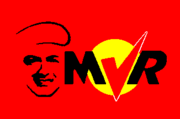Movement for a Fifth Republic
|
Fifth Republic Movement
Movimiento Quinta República |
|
|---|---|
 |
|
| Leader | Hugo Chávez |
| Founded | 1997 |
| Dissolved | 20 October 2007 |
| Merged into | United Socialist Party of Venezuela |
| Headquarters | Plaza Venezuela, Caracas |
| Ideology |
Socialism Bolivarianism Populism |
| Political position | Left-wing |
| International affiliation | Foro de São Paulo |
| Website | |
| Official site | |
The Fifth Republic Movement (Spanish: Movimiento V [Quinta] República, MVR) was a Socialist political party in Venezuela. It was founded in July 1997, following a national congress of the Revolutionary Bolivarian Movement-200, to support the candidacy of Hugo Chávez, the former President of Venezuela, in the 1998 presidential election. The "Fifth Republic" refers to the fact that in 1997 the Republic of Venezuela was the fourth in Venezuelan history, and the Movement aimed to re-found the Republic through a constitutional assembly. Following Chávez' 1998 election victory, this took place in 1999, leading to the 1999 Constitution of Venezuela.
At the legislative elections on 30 July 2000, the party won 91 out of 165 seats in the National Assembly. On the same day Hugo Chávez was elected president in the presidential elections with 59.5% of votes. In the parliamentary elections of 4 December 2005, the party won 114 out of 167 seats with allied parties winning the remaining seats. Opposition parties had unexpectedly withdrawn several days before election day, and turnout was just 25%.
In December 2006 and January 2007 the party started its dissolution, to form the proposed United Socialist Party of Venezuela (PSUV). It merged into PSUV on 20 October 2007.
The MVR was founded in July 1997 to support the electoral aims of the Revolutionary Bolivarian Movement-200. For a number of years after his 1994 release from prison, Chávez maintained a position against participation in elections, believing them a fixed game which merely legitimated the established order. This led to a split with his colleague Francisco Arias Cárdenas, who left the MBR-200. In the early years after his release, Chávez considered the possibility of another coup attempt, but with the prospects appearing slim, some advisers, notably Luis Miquilena, urged him to reconsider his scepticism of the elections, arguing that Chávez could potentially win so convincingly that the establishment would not be able to deny him victory. To find out whether this was the case, Chávez set up teams of psychologists, sociologists, university professors and students to carry out a survey. With their support, grassroots members of the Bolivarian movement polled tens of thousands of people across the country. The results showed that 70% of respondents supported Chávez running for the presidency - and 57% said they would vote for him. Support for the electoral route was strengthened when Arias Cárdenas, as a candidate for Radical Cause, won the Governorship of Zulia State in the December 1995 regional elections. Despite this, the MBR-200 remained divided over electoral participation, and spent a year debating the issue in local, regional and national assemblies. A national congress on 19 April 1997 took from 9 am until 2 am the next day to reach a conclusion, ultimately deciding to launch Chávez' candidacy for the 1998 presidential election. Some members of the movement resigned in protest, holding too much at stake. In July 1997 Chávez registered the new "Fifth Republic Movement" with the National Electoral Council (the name had to be changed as Venezuelan law did not permit parties to use Simon Bolivar's name). The international media took little interest, citing opinion polls showing 8% support for Chávez.
...
Wikipedia
